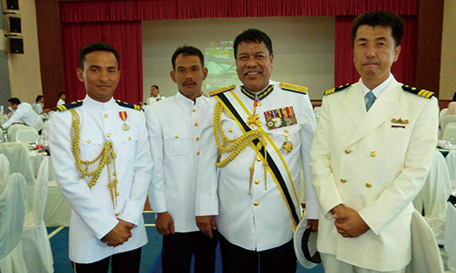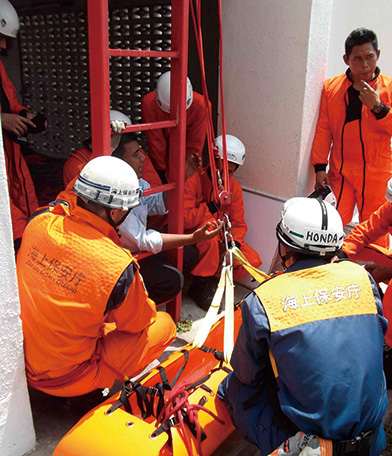Japan's Official Development Assistance White Paper 2012
Stories from the field 2
Malaysian "Umizaru*" Divers Protect International Shipping Routes
– Capacity Building in Maritime Safety and Security –

Mr. Nagasaki at a ceremony for the anniversary of the founding of MMEA with deputy director generals and trainees (Photo: Katsuaki Nagasaki)
Many international shipping routes pass through the territorial waters of Malaysia. One of them is the Strait of Malacca, a key junction for global marine traffic through which 94,000 ships pass each year. Industries involved in maritime affairs are critical to Malaysia and account for about 20% of its gross national product. However, increases in poaching and incidents caused by foreign fishing boats, smuggling, piracy, robbery, illegal immigration and other maritime crimes in recent years have led to serious problems. In November 2005, Malaysia formed the Malaysian Maritime Enforcement Agency (MMEA) to combat such problems.
Japan sent officials from the Japan Coast Guard to Malaysia as JICA experts when MMEA began operating in 2005. They provided technical cooperation on operation systems and human resource development required to engage in the work of maritime security. Technical cooperation began in 2009 as the Capacity Building in Maritime Safety and Security. Maritime law enforcement, search and rescue and other more specialized knowledge and skills are being transferred in addition to past aid. Katsuaki Nagasaki is currently serving as the fifth long-term expert from the Japan Coast Guard. "There is a reason why MMEA requested cooperation from Japan, why we continue training," Mr. Nagasaki said. "In 2006, very soon after MMEA was founded, a special task force was established to handle security and deal with major maritime accidents. Many fires broke out on ships in Malaysian waters from 2009 to 2010, but the special task force was not deployed for any of them. They still had not prepared the knowledge, skills and equipment required to deal with major incidents."

Umizaru spiritedly coaching trainees in stifling heat (Photo: Katsuaki Nagasaki)
MMEA took this situation seriously and decided to establish a special team within the special task force to handle maritime accidents. It asked JICA and the Japan Coast Guard to provide aid to develop that team. At the request of JICA and MMEA, the Japan Coast Guard decided to send special salvage units and divers well versed in dealing with atypical maritime accidents. The divers were professionals who also went by the name Umizaru. Between 2010 and 2012, a total of seven umizaru went to Malaysia to provide expert knowledge and skills.
"The Japan Coast Guard divers reported to Malaysia with the will to impart all their knowledge and experience so that they could help our Malaysian friends improve their skills," Mr. Nagasaki said.
Task force members face death every time they are involved in rescue on the scene at a maritime accident. Compromise and lenient attitudes were completely absent from training in order to prepare them to succeed in brutal conditions. Japan Coast Guard divers spiritedly coached the MMEA task force members in punishing 35°C heat. It was a difficult environment in which to lead. Sometimes, they would forget to take breaks while answering questions from task force members. When they noticed that knots in the ropes the MMEA task force members used for training were loose, they would tie the ropes themselves to show the members the proper way to do it and then make them retie the ropes over and over to practice. It was important for the divers to be attentive to the distinct culture and religion of their trainees. The MMEA task force members were able to undergo training without feeling disturbed because the Japanese divers respected Malaysian culture and allowed them time to pray as called for by Islam.
The training paid off, and the MMEA task force members improved their skills dramatically. The training helped the MMEA members achieve a level high enough for them to teach basic ranger skills to local harbor rescue team members who participated as special trainees. Still, Mr. Nagasaki expects MMEA to grow even more. "Malaysia seeks to join the class of developed countries by continuing to develop, and that is critical to the growth of MMEA as an organization in charge of the safety of the sea," he said. "MMEA is continuing to build its organization with the aim of becoming the greatest coast guard in the world by 2040. I want the MMEA task force members we train to take the initiative to help their organizations grow and be able to train maritime security organizations in other developing countries in places like the Middle East and Africa."
* Umizaru:Japanese for "sea monkey" and the commonly used term for Japanese Coast Guard diver
